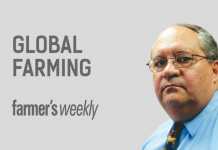Controversial US agriculture secretary Earl Butz used to address consumer groups with a loaf of bread and a bread knife, cutting off a slender slice to illustrate the small “cut” the farmer gets. Whether we’re talking dollars or rands, the farmer’s share of consumer-spend has decreased even more since Butz’s time. Periods of price volatility aggravate the problem. Farmers often find that prices on processed and retail levels follow any increases in producer prices, but seldom follow decreases in producer prices.
The 1930s solution to the problem
In the 1930s farmers faced a severe drought and a long-lasting world depression. Governments realised they had to take steps to protect their beleaguered farmers. From the 1930s to the late 1970s, farmer organisations controlled the agricultural product marketing from farm to retail level. The control boards set prices through the marketing chain, appointed farmer-owned cooperatives as agents to handle the products, and decided when and how much to import or export.
While the controlled marketing system was unpopular in some circles, the farmer got a “fair” share of the retail price. But various roleplayers, especially in the processing and retail sectors, voiced their opposition to the controlled marketing system. They were supported by agricultural economists at some universities who believed that the free market would solve all problems. Heavy-handed actions by the control boards increased the opposition to controlled marketing. In 1998 the new Marketing Act was promulgated, forcing marketing boards to close down.
While we fully deregulated our agricultural marketing system, farmers stayed in control of major agribusinesses. In the 1990s cooperatives become companies, with a few listing on the Johannesburg Stock Exchange (JSE), with farmers effectively losing control of these organisations. Prominent businesspeople realised the value of the former co-ops and started to invest in them.
A good example is PSG, who, through listed company Zeder, now own 41% of Kaap-Agri, 35% of the KWV and large investments in some other agribusinesses. But the beneficiaries of these companies are their shareholders and, as the majority of farmers sold their shares in these companies, they no longer benefit.
A new solution
Globally, farmers realised that they lose out on the profit generated from agricultural products. In the US and other developed countries, farmers developed so-called “new-style” cooperatives. These are generally specific-goal organisations with limited membership.
In South Africa, there are already a few good examples of farmer-controlled businesses that add value to farm products and so ensure the farmer a larger share in the value chain. These new-style co-ops shouldn’t be seen as glorified trade unions with the sole purpose of negotiating higher prices. In fact, it’s illegal for a group of farmers to club together and negotiate higher prices. Farmers who want to do this first need to get Competition Commission exemption.
Farmer-controlled businesses must add value to their products. They have to expand their activities to include a larger part of the value chain. You can’t expect to get a higher price for your product if you don’t add value to it and reduce cost for processors in the chain. In most cases, farmer-controlled businesses need professional management and capital investment. Farmers often want to establish farmer-controlled businesses when prices are low.
If prices rise, they change their minds. It’s important to get a group of like-minded farmers together to establish the farmer-controlled business properly. Provision must be made for new entrants and for resignations. Advice from accountants and legal professionals is usually needed.
The farmer’s share of the consumer rand is shrinking. Primary production is the least profitable of all sectors in a value chain. Farmers can share in the profits made upstream through their own farmer-owned businesses. We should do this before we lose more farmers and the total production lands in the hands of a few large companies.
Dr Koos Coetzee is an agricultural economist at the MPO. All opinions expressed are his own and do not reflect MPO policy.

